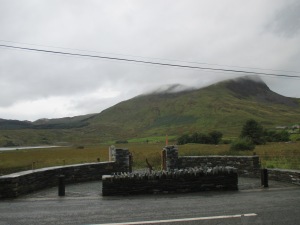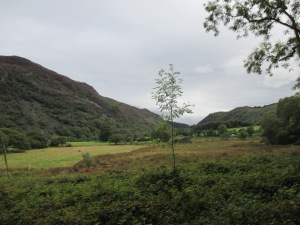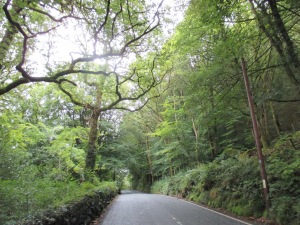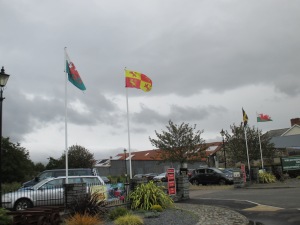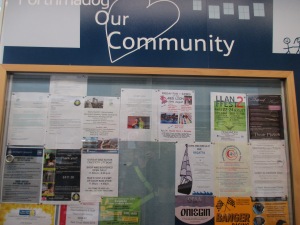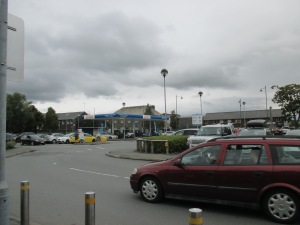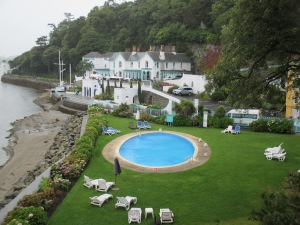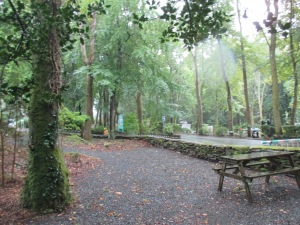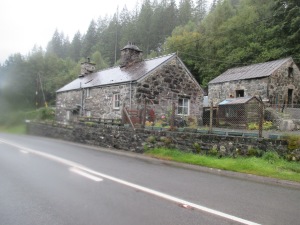‘Is it always as wet as this?’
‘More often than not’.
– Meteorology at the Stag Inn, Dolgellau.
I’ve stayed the night in Bangor, a town in north-west Wales, unremarkable to a large degree except for its expanding university. It has no obvious centre, no heart or locus where its people can mill around and meet. I leave Simon’s place, a gentle man who has kindly hosted me for the night through the Couchsurfing website, and I cycle through the town’s small and modest high street. There’s nothing flash or pretentious about the place, and few things have aspirations here higher than two storeys. Expect no concession to civic ambition, just more discount shops and supermarkets.
I leave by a back route up Penrhos hill, a wavy gradient that threads past a hospital and a range of social housing that varies from ugly to mediocre, condemning people to pebbledashed lives. Then it’s the main road out past the Menai Bridge, detouring through the sleepy village of Y Felinheli, before entering the royal town of Caernarfon. Despite being largely defined by its impressive and imposing 13th century castle, built by English king Edward I to subdue the Welsh, today it has the largest Welsh-speaking population in the country.
North Wales is a very different kind of place to the south, or even mid-Wales, I’m starting to discover. The Welsh language is far more prevalent here. It is not spoken as a kind of academic opt-in – parents pass it down to their children, who also learn it in schools. At times over the coming days I will hear it spoken as often as English. And yet the North Walian language will use different words to the South. Words for ‘milk’, ‘cup of tea’, or ‘moon’ I’m told completely vary. With BBC Wales being based in Cardiff in the south, the kind of Welsh spoken on the television or radio will reflect the more populous and wealthy south.
Somewhere like Caernarfon feels quaint and touristy. I wander by its old castle and onto its harbour marina. It’s raining hard, and tourists push up their hoods, open their umbrellas and stoically weather the downpour. One youth is still optimistic about selling ice creams from a kiosk. It’s hard to imagine that this area was once a hotbed of Welsh nationalist terrorism. From the mid-1960s onwards, groups partly inspired by Basque Separatism and the IRA began to attack dams, electricity power-stations, civic centres and English-owned holiday homes with bombs and arson.
Groups like Mudiad Amddiffyn Cymru (Movement for the Defence of Wales) bombed dam construction sites, tax offices and symbols of English royal authority between 1963 and 1969 after areas of north Wales were flooded to provide water for Liverpool. They’re virtually forgotten now. Strange that around 1969 they nearly managed to blow up part of this castle, or a policeman’s house nearby, or even Llandudno pier in an attempt to target the Royal yacht Britannia – the explosions failed. Then there was the Patriotic Front, and the Free Wales Army, more amateur groups better at publicising its activities than carrying them out. People do however remember a long-running series of arson attacks against English holiday homes, though no-one I speak to remembers who committed them, or what happened. I later trace down Meibion Glyndwr, another amorphous outfit that attacked around 220 holiday homes between 1979 and 1994, as well as sending small postal bombs to estate agents and Conservative politicians.
There have been no such attacks for some time, and calls for an independent Welsh state are not something I encounter through this more fiery and distinctly, affirmatively Walian part of the country. I hear no justification of the property attacks, though I’m still told about high house prices in the area. I tell interlocutors that this is a common problem, as I’ve found. I recall my experiences on Skye, through Suffolk and Norfolk, of the Cairngorms, the Lakes, the Dales.
‘People from the south coming in’, meaning people from the south-east of England, London. ‘End London rule’ the stickers declared in remote Tain and Wick on the north-eastern tip of the mainland. Young people in these rural areas no longer have an entry into the kinds of work their grandparents had, or their parents to a degree rejected in preference for the new social opportunities of the Sixties and Seventies. And why keep on farming on subsistence pay when one can sell the land for property developments and have a few years of relative wealth off the back of it? But it is rare to work with one’s hands, unless that involves stacking a supermarket shelf. So they will leave their homes for the larger cities, perhaps to university, perhaps not. Those who succeed in competitive but ultimately high-income jobs in law, PR, or property will acquire the possibility to buy a nice place back home, like these incomers who first drove up local house prices and encouraged arable land to become residential or holiday properties. They might return, dressing and speaking like those ‘white settlers’ as Meibion Glyndwr called them who first arrived decades back.
‘Meritocracy’, always intended as a pejorative term, is particularly meaningless here. Like in the larger cities where household poverty is increasingly being passed on from one generation to another, the possibility of ‘social mobility’ is remote. What does social mobility mean anyway, except that people are given consistently equal opportunities to succeed in education and work? The deindustrialisation of North Wales will be mirrored in the south. Tourism is a dangerously vulnerable thing to be dependent upon. Meanwhile, those from wealthier or more educated backgrounds are scrambling towards positions of professional affluence: private tutors at schools, parental backing and financial support to supplement an increasingly insufficient university maintenance loan, then unpaid internships, or professional connections that lead to placements and promotions. Or trust funds, or an inheritance, like that I received around six months ago which made getting married in Hawaii possible, and which ensures I’ll never be totally skint during these travels. I’m just as much a part of this young middle-class, financially insecure now but possessing the qualifications and cultural credentials that will probably lead to a well-paid job in one of the professions two decades down the line. Everything is ambivalent. Reader, never trust your author too earnestly…
I leave rainy Caernarfon with its ghostly bombmakers and bobbing boats, and take a delightful road back up into the hills of Snowdonia. I’m cycling south-east now, towards the small tourist resort of Beddgelert. There’s a quick and delightful contrast in the landscapes which change around me, from the flat arable lands and slithers of streams that surround settlements like Caernarfon or Llanberis that then become forests, thick and piney, the music in one’s ears of the breeze accelerating and varying through the spindly trees. So sweet it is to be encircles by trees. Cycling through Snowdonia is just heavenly, even in bad weather. I love to gaze out at the flat valleys between peaks that appear like an untrodden wilderness, an inhospitable yet tranquil scene of sharp rocks dispersed across plains of heather and lank grasses, bracken bursting around them. One could easily lose one’s place here in a landscape devoid of landmarks. Were I a hiker, I’d clutch my OS map with care. These expanses feel unknowable, too slow to recognise oneself in. In that, they are like the north-west Scottish Highlands. I notice that some of the trees are starting to discolour to a yellowy-brown, suggesting perhaps the end of summer, or at least an August that was all-too parsimonious with its sunlight.
I reach Beddgelert, a small village that is given over to mountaineering tourism, though not as shamelessly as Betwys-y-Coed. There are tea rooms, a pub and some small tourist shops that today I choose to avoid, and groups of visitors relieved by the availability of ice creams, cappuccinos and postcards after the placeless mysteries of the surrounding wilds. There’s not much to the place except a fiction, probably generated by enterprising men keen to establish a tourist attraction, like the naming of Llanfair…PG, or the ludicrous and fun sports like bog snorkelling or man versus horse races that take place in in Llanwrytd Wells, the inspiration of local man Gordon Green. I’ll meet a bog-snorkelling champion the next day in Machynlleth. But let’s tell that story.
The village is named after Gelert, the loyal hunting hound of Llewelyn, prince of Gywnedd. One day the prince went hunting without his trusty companion who he could not find anywhere. Confused, he returned to his palace where he was greeted by Gelert, fangs bared and covered in blood. His son’s cot was empty and his bedclothes scattered about the place. Suspecting the worst, Llewelyn stabbed Gelert through the heart with his sword. But lo, as the trusty dog released his drying cry, his son whimpered in the distance, still alive, and besides the trunk of a great wolf which Gelert had slain. The prince was so sad and remorseful that he never smiled again, and in tribute to poor faithful Gelert, buried the dog here…
I sit outside a tourist café and speak to my partner on the phone. One of her acquaintances has been unfairly grassed up to the job centre by an abusive ex-partner, and has had all her benefits cut off. There’s no longer any realistic possibility of a crisis loan, or few charities to appeal to now who might help. No matter how quaint the scenery or remote the landscape I reach, in the distance I hear salvos of a full-scale war against the poor being waged with unparalleled success by a corrupt political establishment, and more everyday stories of sadness and malice, the rough always with the smooth. Where are the Anarchist or Marxist soup kitchens, unemployment advice centres, thriving publications or squatters centres? Discontent with this establishment is at a high, but there’s been little success in establishing a popular and demotic left-learning opposition. Trade unions have become outmanoeuvred by legal restrictions against their activities and a transition towards contractless, zero-hours agency work. It’s such an inappropriate place to think about this rubbish, but here I am, watching families argue about where to eat their overpriced lunches, and thinking about the paradigm shift that took place from the late 1990s, when access to cheap consumer goods and credit exploded at the same time that New Labour established a soft Thatcherism, prioritising hard-working individuals and their families over social commitments to establish a more equal and fair future. In a perverse way, the People’s Republic of China has been a tremendous ally in this shift, establishing the cheap manufacturing techniques and bases for the televisions, computers and mobile phones that supply us with free communication and entertainment even when the gas might be cut off.
Well OK, enough you say. Back to the ride. It’s lovely cycling through this part of Snowdonia after Beddgelert. I take another road weaving south-west towards Tremadog and Porthmadog, whizzing down through forests interspersed with jolting glimmers of rivers and sheep. Porthmadog itself is a small seaside resort, a little shabby but bustling with visitors. I stop in the obligatory large out-of-town supermarket that’s wiped out local high-street traders, as I often do, before passing through the chicken run of a high-street, packed to saturation, betting shops, chippies and pubs supplying diverse remedies for the ambient boredom of the town. I head out along Britannia Way, the view of the nearby bay frustratingly guarded by an ugly wall, then reach the small village of Minffordd, where I take the road off to the mysterious and altogether marvellous seaside village of Portmeirion.
It’s a windy mile road through a small forest and past the castle Deudraeth, and along security fences for a forthcoming luxury music festival. I park the bike and pay seven pounds to enter this kingdom of the unfettered imagination. Just look around! Up, down and around are these fairytale houses, shelters, staircases, lighthouses, lawns and cultivated wilderness, even a temple, filled with playful flourishes and fantasy flourishes. Most is Italianate in style, designed by Sir Clough Williams-Ellis from 1925 to 1975 as an experiment to combine beauty and pleasure in a man-made environment. It is just delightful. ‘An architect has strange pleasures’, he wrote back in 1924. ‘He will lie awake listening to the storm in the night and think how the rain is beating on his roofs, he will see the sun return and will think that it was for just such sunshine that his shadow-throwing mouldings were made.’
The village became popularised through the The Prisoner, a superb late-Sixties’ thriller about a government official imprisoned on the resort. Played charismatically and suavely by Patrick McGoohan, ‘Number Six’ finds himself trapped and unable to escape after inexplicably resigning from a prominent government post. Whilst his captors seek to find out why he quit, Number Six struggles to find out why he is here. The village is cheery and filled with merriment, filled with hundreds of people tranquilly enjoying the staid and holiday-like life in the resort. They have no identity beyond their individual numbers. Only Number Six wants to escape, but his attempts to leave are thwarted by the sophisticated surveillance and security devices dotted around the resort, from sleeping gas to a large inflatable ball which chases and catches any attempt to escape across the sand.
‘I am not a number, I am a free man!’
The show seems to anticipate how power and authority transformed in the ways they are mediated. There’s a subtle totalitarianism in the village, where every aspect of people’s lives are watched and controlled by a distant and unaccountable authority. Number Six does not know why he is there. Like K. in Kafka’s The Trial, all he demands is a fair explanation of his sentence. Yet the show never reveals who Number One is, whilst Number Two, the most powerful individual in the village and the one charged with securing some kind of confession from Number Six, changes from week to week. Number Six cannot even enter specific buildings. He’s warned that the town hall is very particular about who it lets in. Like K., he insists on his individual freedom, but his cries are always ringed with a kind of frustrated and impossible naivety.
‘I will not be pushed, filed, stamped, indexed, briefed, debriefed, or numbered! My life is my own!’
But Number Six has lost ‘his’ life, his name and his freedom to move. He has become abstracted and digitised. Better then he do what the others of the village do, sit back and enjoy the comforts provided in docility? That’s the dilemma. Or fight against all odds for his own freedom, and that of the freedom of the private individual over the security of the state? This is when the all-too-hard arm of the law is expressed. ‘If you want a vision of the future, imagine a boot stamping on a human face – forever’, as O’Brien warned in George Orwell’s dystopia Nineteen Eighty-Four. In The Prisoner, or a society of subtle but suffused security measures, this boot might be replaced with a shiny leather toe-press shoe. Of course, these kids of narratives aren’t indications of a reality but possess a kind of warning. It seems pertinent.
Rain’s falling hard, and it’s difficult to spend too much time in the open. I find shelter in Number Six’s small house, now turned into a gift shop. The lady here is happy to talk whilst I take shelter. She tells me about the many distant visitors they receive, particularly from Japan, China, the United States and Canada. Why, I ask. She’s unsure, but notes The Prisoner’s underlying theme of an individual struggling against an omnipotent authority, and leaves the suggestion open. We move onto more local matters.
‘Some people ask, do you have to learn Welsh here? … It’s like they think we’re a county of England. But we speak it, and we learn it, because we want to. It’s our culture, our way of life. We’re a separate country.’
Simon in Bangor pointed out that there is no phrase for ‘have’ in Welsh, but ‘with’. So, ‘the bag or house is with me’, rather than ‘I have a house or bag’. She tells me about these great linguistic differences across Wales. ‘If someone from south Wales came in here and spoke to me, I wouldn’t be able to understand most of what they’re saying!’ It’s the dialect, but also the articulation of common words too. Like with those parents and young people I met in the Scottish Highlands, she thinks that it’s important that children are taught Welsh in schools as method of learning, not simply as just an optional language. Learning history, science or geography in Welsh further cements and normalises it. She compares her own experience forty years ago, when only history was taught in Welsh. After being near-universally spoken across Wales in the 19th century to a substantial decline over the 20th century, Welsh is now beginning a kind of revival. But, as Simon also argued, it needs to be wanted. It’s not enough to speak it in schools or have it on road-signs: it must be spoken in the home, passed down through families. This advice should be heeded by those who want to see the expansion of Scottish Gaelic.
It’s a monsoon by the time I leave, and there’ll be no reprieve for a good few hours. I leave Portmeirion and head south. The rain sprays into my eyes as if I’m facing a shower head, and my clothes are quickly soaked. I’ve covered myself in a warm armour of wool jumper, trapper hat and waterproof trousers, but nothing is totally waterproof against hours spent in torrential rain. My glasses mist up with condensation, making even navigating difficult. The road is, from what I make of it, largely flat and dull. Thick mists hang over the valleys, and I glimpse those same forests in the distance. A distant and seemingly-disused power station stands in the difference, but little changes. It’s a moment that requires fortitude, determination. If you were around north-west Wales that Monday afternoon, you may have seen a dripping blue monster on a bicycle, singing and cursing in the rain!
I’d anticipated the downpour, and booked another hostel place in a remote spot south of Dolgellau (pronounced ‘Dolgecly’ I think, though some of these places names challenge all attempts at articulation). I take a break in the small town that bears its name, defined by its sturdy quarried bricks, grey and morose like the skies, and narrow lanes with a small queen square. It’s a bank holiday Monday, and there are drunk lads singing and shouting in the streets, but all is pleasant and well. I pop into the pub they’ve just left, the Stag Inn, to dry out.
The jukebox’s having a joke on the melancholy punters inside: ‘Wish you were here’ by Pink Floyd. Around half the drinkers here are tourists, the others drunk locals. A couple following me in also complain about their weather, and I quickly regret bringing it up with the weary barmaid. ‘The weather’s crap’, says one fella pointedly. ‘Well, I apologise on behalf of the local area.’
Locals sing along to the jukebox. ‘I had a dream and so did you. Life was pure and love was true … Those yesterdreams were just a cruel and selfish game we used to play…’ Conversation threads from music (‘ I’ve never been out dancing in my life. I can’t think of anything worse’, another barmaid says) to rugby. ‘It’s a man’s game…’, one punter exclaims. ‘No, women play it too!’. The barmaid tells me about the area. ‘There’s nothing here except the minimum wage. Local industries have gone.’ She tells me about one meat-packing place that recently closed after losing a supermarket contract. She’s from Manchester, but came to this remote village to work on a nearby oil pipeline. After meeting a local fella she decided to stick around. She’s neither happy nor sad about the place, but feels that it’s not worth getting a better paid job in a bigger city like nearby Aberystwyth or Bangor as the transport costs would cancel out the pay increase. Minimum wage just about works.
I leave Dolgellau and take a road out to Tywyn on the coast. My destination, a slither of a road up a steep hill and then through a dark forest, is the youth hostel Kings. Darkness is setting in and it’s hard to make out the road from the grey dusk. The hostel itself is a perfect place to escape. There’s no phone signal and no internet access, and no shops or pubs for miles and miles. Just walk and explore, or stop and observe, as you please. One can camp here or take a bed. In the distance is the gushing of a stream, ‘like the sound of crying’, as a man called Peter puts it later in the hostel dining room.
I settle in with a couple of bottles of beer and, having no internet access, dig out something to read. I’m looking at Mark Thomas’s The People’s Manifesto, produced over a live tour from April 2009 and published in 2010. Audiences were given blank forms to make suggestions for political change before the show started. He would read through these, remove any weirdo suggestions or duplicates, and then present the rest to the audience, discussing the pros and cons, and getting them to vote on the most popular suggestions at the end. The book is therefore a condensed summary of this unusual democratic procedure. Much of it reflects frustrations with politicians, such as that party manifestos should be legally binding, MPs should not be paid wages but loans, and MPs should have no job other than that of being an MP, as well as a none of the above option on ballots. There’s some Daily Mail biting (its masthead should reveal its support for Nazis as that would be only historically accurate thing on front page), and attacks on private wealth (‘shut down tax havens … Bomb Switzerland’). Others are seemingly funny but fair, reflecting common grievances from wayward and uncollected dog turds to how products are modelled – models should be chosen at random from the electoral roll, or having a call in sick ‘fuck it day’ at work.
How improved would life on these islands be? It’s an interesting thought, though a shame that nothing too serious has been made of the book or the project. It’s a reminder that there’s no necessary gain in convening a series of political demands or ideas in themselves; there must be a movement that threatens to make them real and actualise them.
I watch a spider struggle to make its web on the other side of the window-pane. The wind and rain harass and blow it hither and thither, and its web starts to fall apart, but it patches it up and carries on. No other creature will aid it except itself and its determination. I finish the book and my consciousness starts to fade. Wales is revealing itself to be a far more beautiful, beguiling and surprising place than I’d even hoped for.










































